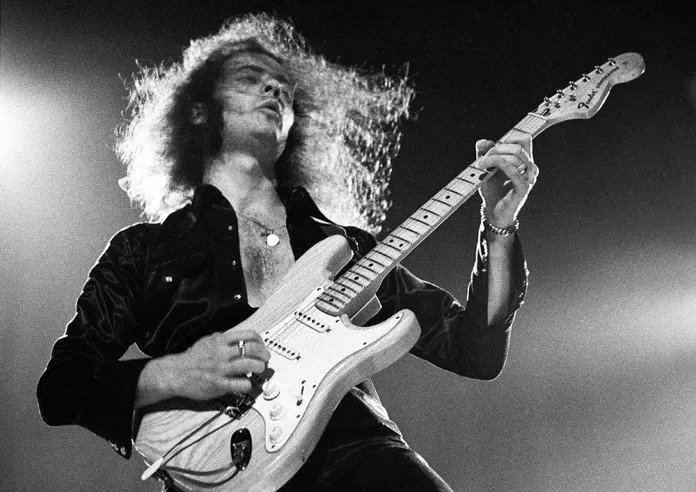Ritchie Blackmore began his career as a session player for Joe Meek’s music productions in 1960, while also performing with many local bands. Of course, he rose to prominence as a member of Deep Purple, one of the world’s most influential bands in the early 1970s. Since forming Rainbow in 1975, which also became one of the most prominent Hard Rock bands of all time, he became one of the rare musicians in the world who could continue their popularity after leaving a famous group.
He truly established himself as a guitar star in the 1970s, thanks to his captivating stage persona as well as his amazing riffs and solos. In addition, he is regarded as a sincere individual who never hesitated to express his genuine opinions on his colleagues. He went on to say which guitarist from the 1970s he felt was underappreciated.
The guitarist that Ritchie Blackmore said was overrated in the 70s
The British Invasion in the 1960s saw the formation of the first wave of extremely successful rock bands in the United Kingdom. They conquered the globe, demonstrating the possibilities of combining the Blues with Rock and roll. A few years later, Deep Purple actually emerged, attempting to determine their sound. They wouldn’t be known until 1970 when their highly regarded album “Deep Purple In Rock” was released. After releasing that album, they believed they belonged in the Hard Rock genre.
The bands that first emerged in the 1960s were attempting to explore and reinvent their sound in the early 1970s as the music was evolving. One of them was The Who, who put out some of their most significant albums at the start of that decade, including “Who’s Next” (1971). Pete Townshend, the band’s guitarist, didn’t exactly win Blackmore over, despite the fact that the band was adored by many reviewers and had millions of followers worldwide.
In a 1973 interview with Martin K. Webb, he disclosed that Townshend was overvalued. He concurred with the interviewer who stated that the guitarist, primary composer, and occasionally singer of The Who was the first to employ feedback. Even while he believes he was good “at his chord scene,” he also acknowledged that he wasn’t a decent guitarist.
He said, “Pete Townshend was definitely the first (To use feedback). But not being that good a guitarist, he used to just sort of crash chords and let the guitar feedback. He didn’t get into twiddling with the dials on the amplifier until much later.”
Blackmore added, “He’s overrated in England. But at the same time you find a lot of people like Jeff Beck and Hendrix getting credit for things he started. Townshend was the first to break his guitar. He was the first to do a lot of things. He’s very good at his chord scene too.”
The phenomenon known as “feedback” happens when a guitar’s pickups pick up and reap the sound made by the amplified strings. This produces a “loop of sound,” as the term goes.
Blackmore also chastised Townshend for circling the stage during the same chat. Martin questioned him about why he didn’t enjoy “leaping” around the stage. He gave examples from a few well-known artists to clarify.
Ritchie commented, “I like leaping around on stage as long as it’s done with class. Like Free. They’re the best band in England. Paul Rodgers is a good singer and a brilliant mover. None of this jumping up in the air and doing the splits and all that. He just moves with the music. Not like Pete Townshend who’s gotten to the point that he waits until the photographers are well-aimed before he leaps. He’s not very spontaneous.”
Pete Townshend said he would never like to be in a guitar battle with players like Blackmore
Since Pete Townshend is The Who’s principal songwriter and mostly plays rhythm guitar, it is difficult to categorize his function in the band as simply that of a guitarist. He therefore cannot always be categorized with other well-known guitar legends who are renowned for their intricate and protracted guitar solos.
Townshend acknowledged this when he stated in a 1980 interview with Sound International magazine that he would never want to face off against musicians such as Ritchie Blackmore in a guitar duel. He was asked if having a technique like that of Jeff Beck, for example, was significant to him. He responded by using Blackmore as an example.
“Not really. Sometimes in the past, it’s made me a bit catty towards that kind of player. Catty through a certain amount of jealousy I suppose. I suppose I’ve never respected them that greatly. There are only sort of odd records that Beck and Page have come up with that I really liked.”
He continued, “And I’ve never invited comparisons to that kind of player. Like I said before, you’ve got your Erics and Jimi Hendrixes, Jimmy Page, Blackmore, and Jeff. People like that who are out there doing that particular thing.”
“But I feel myself in a slightly different place. And even today I would never want to get into a guitar battle with people of that caliber. Because for me, ultimately, the joy I would get from expressing myself through a solo would never be as great and would never be as fulfilling as the joy I get from expressing myself through a song.”
